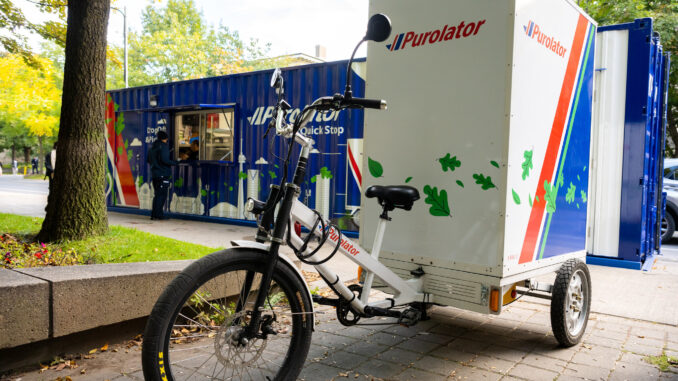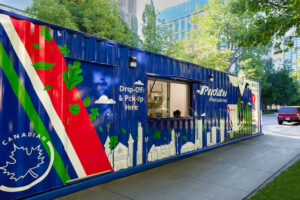
TORONTO, Oct. 13, 2022 /CNW/ – Today, Purolator, the University of Toronto and the City of Toronto launched a second Urban Quick Stop “mini hub.” Made from a 40-foot shipping container and located on the university’s downtown campus near 60 St. George Street, the new mini hub will replace Purolator delivery trucks with electric cargo bikes (e-bikes) to service the surrounding area. The St. George Urban Quick Stop offers full retail services for customers to drop off and pick up shipments. This innovative shipping solution also introduces a fully electric sustainable option of environmentally friendly e-bikes to replace truck deliveries in the area.

The Urban Quick Stop will serve as a living laboratory for transportation researchers at the university’s Mobility Network and the Smart Freight Centre. The Smart Freight Centre is a collaborative research hub focused on improving the economic vibrancy of business, environmental sustainability, and quality of life across the Greater Toronto and Hamilton Area. Using data provided by Purolator via embedded sensors on the e-bikes, the team will conduct an extensive analysis of the impact of replacing large vehicles on campus and in the surrounding community. The analysis will include emissions reduction, operational efficiency, parking experiences and interactions with pedestrians and cyclists. Vehicle and air quality tracking will also be conducted, and camera technology will be used to assess impacts of the operations on cyclists and motorists.
This work also supports the City of Toronto’s Freight and Goods Movement Strategy – a comprehensive set of actions aimed at right-sizing delivery across Toronto. Led by the Transportation Services division, in partnership with other City divisions, agencies and external partners, the actions support improvements to Toronto’s transportation system to increase efficiency and reliability for shipment and freight movement, limit negative impacts on the environment by reducing greenhouse gas (GHG) emissions, reduce negative impacts on neighbourhoods most affected by shipments, and improve road safety across the city.
The first Purolator Urban Quick Stop opened in July at the Green P parking lot at 19 Spadina Road (north of Bloor Street West). The two Urban Quick Stop mini hubs are part of a pilot program with a total of five e-bikes. The program is expected to decrease traffic congestion and CO2 emissions by 68 tonnes per year.
“Our partnerships with universities and municipalities have helped us make tremendous progress against our research and development initiatives,” said Ricardo Costa, Purolator’s Senior Vice President and Chief Technology Officer. “We’ve been able to respond to the increase in challenges of urban delivery and heightened focus on sustainability through more efficient network designs and electric vehicles. “Now, working with the University of Toronto and the City of Toronto, we can further reduce traffic congestion, deliver more efficiently and eliminate the need for parking our trucks in Toronto.”
“Having the Urban Quick Stop right here on campus provides a golden opportunity for our researchers and students to gather the high-quality data they need to understand how innovations in transportation affect everything from traffic congestion to climate change to public health,” said U of T Engineering Professor Matthew Roorda, Chair, Scientific Advisory Committee, Smart Freight Centre. “The insights we gain from this project will help drive the development and adoption of sustainable transport solutions and technologies, both here in Toronto and in other urban areas around the world.”
“This Urban Quick Stop not only offers nimble pick-up and drop-off services, but also gives us the insights we need in developing sustainable last-mile delivery options in dense urban areas,” said Barbara Gray, General Manager, Transportation Services, City of Toronto. “Coupled with other work the City is doing to improve shipping and goods movement, the innovative pilot program will make deliveries greener, faster and cheaper.”
SOURCE Purolator Inc.

Leave a Reply